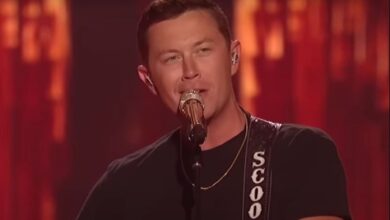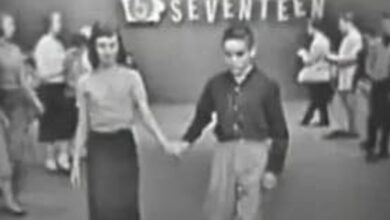His Voice Reflected Pain; Two Months Later, He Passed, Still A Lion, Though Frail
Johnny Cash’s final live performance on July 5, 2003, at the Carter Family Fold in Hiltons, Virginia, stands as a poignant and powerful conclusion to a storied career that shaped American music. Despite facing considerable health challenges, including significant vision loss and physical frailty, Cash’s performance was marked by a resilience and dedication that highlighted his enduring legacy. The event was further imbued with personal significance, coming just months after the death of his beloved wife, June Carter Cash, which had a profound impact on him.
Cash’s entrance, marked by his signature greeting, “Hello, I’m Johnny Cash,” set the tone for the evening. Accompanied by a small band that featured his son, John Carter Cash, on vocals, as well as Jerry Hensley on guitar and Bobby Starnes on bass, Cash delivered a setlist of his most cherished songs. Classics such as “Folsom Prison Blues,” “I Walk the Line,” “Ring of Fire,” “Big River,” and Kris Kristofferson’s “Sunday Mornin’ Comin’ Down” were performed with a raw intensity that reflected his deep emotional connection to the material.
A particularly moving moment was Cash’s rendition of “Angel Band,” a song that had been performed by Emmylou Harris at June Carter Cash’s funeral. This rendition served as a deeply personal tribute, echoing his sense of loss and honoring his late wife’s memory. Another notable highlight was the performance of “Understand Your Man,” a song Cash had not sung in over twenty years. This rare performance provided a nostalgic glimpse into his extensive career and served as a reminder of his significant contributions to music.
Throughout the concert, Cash’s voice, though weathered by age and illness, retained a profound emotional depth. His ability to convey personal pain and reflection through his music created a strong connection with the audience. He openly acknowledged the influence of June’s spirit and the inspiration she continued to provide him, merging his personal grief with his artistry in a way that was deeply impactful.
Johnny Cash’s influence on American music was far-reaching, transcending genre boundaries from country to rock and folk. His unique ability to blend his personal experiences with his music made him a cultural icon, and his final performance exemplified the power of his artistry. This last concert, marked by its emotional intensity and personal resonance, stands as a testament to Cash’s remarkable career and the indelible mark he left on the music world.





